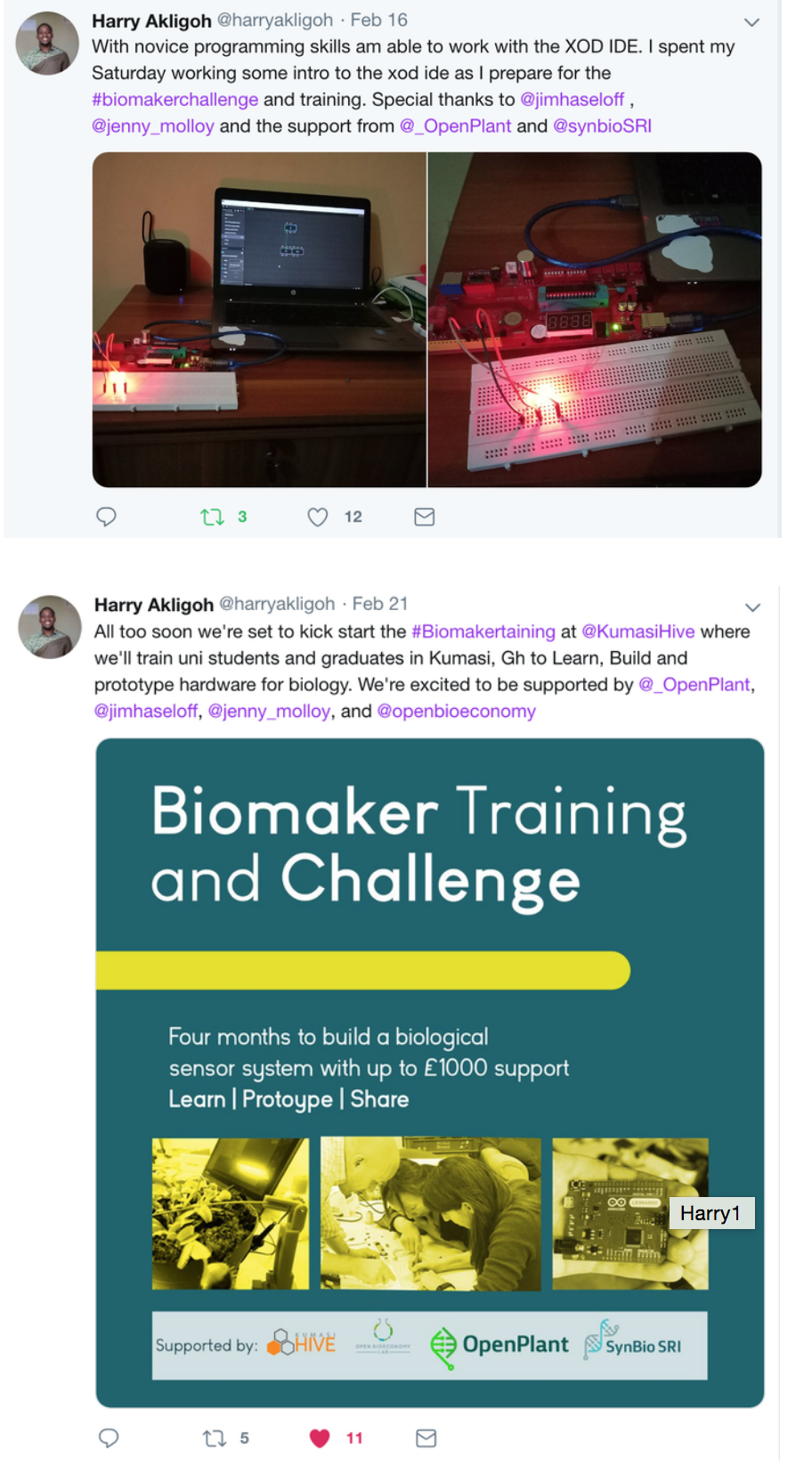Biomaker Initiative Awarded £80k for Capacity Building in Africa!
The Global Challenges Research Fund (GCRF) supports interdisciplinary activities that address problems of developing countries and aims to develop sustainable and innovative solutions. The SynBio SRI is excited to announce that, together with Dr Lara Allen and Dr Jenny Molloy, we have been successful in a bid to implement the Biomaker programme with key partners in African institutions to build local expertise and capacity through knowledge sharing and exchange of open-source materials.
Background
Modern approaches to biology are introducing engineering principles to address a wide range of practical challenges. They are providing low-cost, breakthrough tools and technologies such as (i) standardised, modular DNA parts and rapid assembly of genetic circuits for reprogramming biological systems; (ii) cell free expression systems and can be freeze-dried and stored at ambient temperatures to eliminate the need for refrigeration and avoid the costs, resources and regulatory hurdles associated with the deployment of genetically modified organisms, (iii) low-cost, customisable instrumentation for interdisciplinary research projects and (iv) legal frameworks and repositories for the free exchange of genetic materials. This work has been pioneered in Cambridge by a consortium of scientists working together as part of OpenPlant.
While these new technologies are relatively low-cost, and have the potential to allow radical new approaches to education and training in low resource environments, their adoption in low resource environments is limited by deficits in technical training, poor access to new research materials, requirement for expensive laboratory facilities, and lack of strategic partnerships with better established research institutions.
We have established Biomaker in Cambridge, a programme for project-based training and application development. Interdisciplinary teams are provided with starter kits and technical resources that allow the design and construction of low-cost instrumentation for biological experimentation and field applications in low-resource environments. The GCRF award will allow us to implement the Biomaker programme with key partners located in African institutions, and build local expertise and capacity through knowledge sharing and exchange of open-source tools and materials.
Our partners (more information via www.biomaker.org)
Dr Lara Allen (Centre for Global Equality)
Dr Jenny Molloy (Shuttleworth fellow, Biomakespace)
Jorge Appiah (Kumasi Hive, Ghana)
Prof Tesfa Tegegne Asfaw (Bahir Dar University, Ethiopia)
Dr Steven Hussey (University of Pretoria, south Africa)
Prof Walid M. El-Sharoud (Mansoura University, Egypt)
Dr Fernan Federici (Pontifical Catholic University, Chile)
Harry Akligoh of Kumasi Hive in Ghana getting ready to pilot Biomaker!
Our aims:
(i) We adapt practical, reusable and open web resources based on visual programming of microcontroller devices for interdisciplinary project-based learning in African universities, community labs and industry.
(ii) We will establish Biomaker programmes at the University of Bahir Dar, Ethiopia, The Mansour University, Egypt, the University of Pretoria, South Africa, the Kumasi Hive community lab, Ghana and the Cambridge-Africa Molecular Lab Training Workshop.
(iii) Biomaker Africa projects will allow the construction of low-cost programmable devices that can be used for many practical applications, including environmental sensing, diagnostics, pump and motor control, remote imaging, range finding and communication.
(iv) We have established a web-based platform for collecting the outputs of Biomaker projects. This provides a free mechanism for documentation and global sharing of all projects. Further, individuals will automatically build personal portfolios. The platform has an international user base of over 700,000.
(v) We aim to promote sharing between international teams, and to facilitate a franchise model for sustainable funding of the programmes.
Biomaker Africa will promote development of practical solutions and social impact, through exchange and shared knowledge and generation of open-source tools and materials. The open-ended nature of the Biomaker challenge ensures a wide set of outcomes but the major outputs from the proposed programme will be a wide range of customised instrumentation for interdisciplinary projects. We have supported 140 diverse projects, which are documented on the Biomaker website and Hackster platform. We expect that funding of the Biomaker Africa proposal would add an additional ~200 projects to this resource. Online documentation, along with a common set of core hardware and programming resources will encourage exchange and reuse.
New technologies are introducing low-cost tools that can be used for a wide range of challenges including diagnostics, environmental conservation, bioproduction, crop improvement and human health. These are of critical importance to the future well-being and economic development of sustainable societies across the planet. Further, Biomaker Africa will provide a practical forum for canvassing of real-world problems and exploration of possible solutions – and provide an important conduit for communication between well-resourced UK labs and low and middle-income country-based workers, who are directly tackling day-to-day problems and challenges in implementing solutions.

